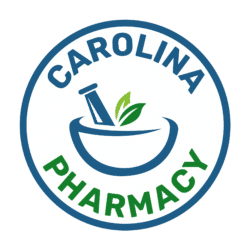
Posted on March 9, 2025
Last updated on June 16th, 2025 at 03:41 pm
After taking medication for an illness or condition, you should expect to feel better. However, some drugs can have effects on the body and may cause adverse reactions. If you’ve ever taken medication and noticed an unusual reaction in or on your body, then it’s important for you to know why it happens and if you should change your medication.
Just like food allergies, you can be allergic to certain medications. Your body can perceive certain drugs as allergens because they are not recognized in your system. Unfortunately, even with a smaller dosage, some medications will still cause a reaction.
In 2025, understanding drug reactions is more important than ever as medications become more advanced and personalized. While most drugs help treat conditions, some can trigger adverse reactions, from mild rashes to life-threatening anaphylaxis. At Carolina Pharmacy, we combine cutting-edge pharmacogenetic testing with expert care to help Charlotte residents identify and manage drug allergies safely.
Causes of Drug Allergies
When your body encounters a new medication, it may mistakenly identify the drug as a harmful invader, triggering your immune system to produce defensive antibodies. These antibodies attack the substance, leading to allergic reactions that can range from mild rashes to severe anaphylaxis. Reactions may occur immediately after the first dose or develop over time with repeated use, which is why doctors sometimes monitor patients closely when starting new medications.
Key Insight: Genetic factors and previous drug exposures can influence your risk, making personalized allergy testing a valuable preventive tool in modern healthcare.
Symptoms of Drug Allergies
These are mild symptoms of a drug reaction, with the mildest being a small rash on the body. However, drug reactions can be as severe as Anaphylaxis. Anaphylaxis is a severe, life-threatening reaction that causes the throat to close up, making it hard for the patient to breathe.
| Mild to Moderate | Severe (Seek Emergency Care) |
| Skin rash/hives | Anaphylaxis (throat swelling) |
| Itching | Wheezing/struggling to breathe |
| Mild swelling | Rapid heart rate/dizziness |
| Upset stomach | Confusion/loss of consciousness |
How to Recognize a Drug Reaction?
Your body may react to medications it perceives as threats, triggering immune responses that release symptom-causing chemicals. Key indicators include:
- Common signs: Skin rashes (often appearing first), digestive issues, or breathing difficulties
- Timing: Symptoms typically emerge within hours of taking medication
- Subtle cases: Mild reactions may mimic other issues (like food sensitivities or skin irritation)
Pro Tip: Keep a symptom journal when starting new medications to help distinguish drug reactions from other causes.
Drug Reaction Timeline & Management
When Reactions Occur:
- Immediate (severe): Anaphylaxis develops within minutes (always requires emergency epinephrine)
- Delayed onset: Most reactions appear hours to 2 weeks after taking medication
- Variable factors: Depends on medication type and individual metabolism
Duration of Symptoms:
- Typically resolves within days/weeks after stopping the drug
- Anaphylaxis symptoms improve rapidly with epinephrine treatment
- Persistent cases may require medical detox support
Smart Prevention in 2025:
Pharmacogenetic Testing Advantages:
- Identifies high-risk medications before you take them
- Simple cheek swab with fast results
- Covered by most insurance plans
- Available at our Charlotte pharmacy
Pro Tip: Combine genetic testing with our digital symptom tracker app for complete medication safety monitoring.
Why Pharmacogenetic Testing is Your Best Defense Against Drug Reactions?
A pharmacogenetic test is one of the best ways you can save yourself from an adverse drug reaction in the future. The following are the key benefits:
- Prevent Dangerous Reactions Before They Happen
- Identifies medications likely to cause adverse effects based on your unique DNA
- Helps avoid trial-and-error prescribing that could put you at risk
- Personalized Medication Guidance
- Reveals which drugs will work best with your biochemistry
- Applies to both prescription and over-the-counter medications
- Simple, Convenient Process
- Quick cheek swab test available at our Charlotte pharmacy
- No needles or complicated procedures
- Fast, actionable results you can share with all your healthcare providers
- Long-Term Health Protection
- Creates a permanent genetic profile for future medication decisions
- Particularly valuable for patients taking multiple medications
- Covered by most insurance plans
“Knowledge is power – especially when it comes to your medications. Pharmacogenetic testing gives you the information you need to avoid dangerous reactions before they occur.”
Reach Out for a Free Pharmacogenetic Test Consultation in Charlotte, NC
Whether you notice a rash on day one of using your medication or you start feeling it a few days in, the first thing you always need to do is stop the medication. Mild drug reaction symptoms can start as rashes or hives and then progress into diarrhea and fever if not properly managed. It’s also just as important to get a pharmacogenetic test when you notice an unusual drug reaction.
At Carolina Pharmacy, we provide convenient pharmacogenetic testing in Charlotte, NC, to help you with any drug reactions you might have. We are devoted to your health and overall wellness, which is why we provide the highest quality prescriptions and personal healthcare services.
Contact us to schedule your appointment today and let us help you make healthcare easy.



